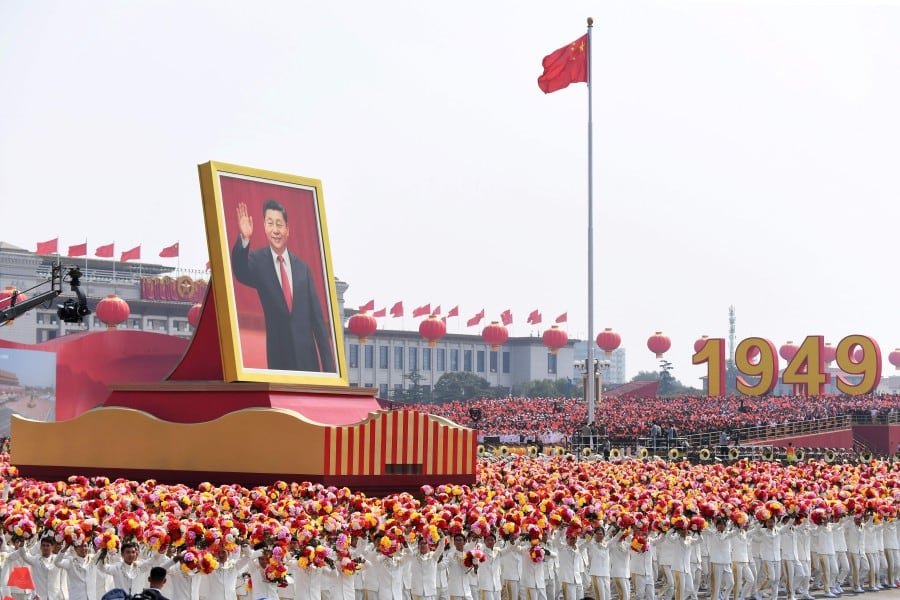Milan Simurdic and Marko Savkovic*
Photo: AFP
Tramp, Xi and Putin versus Europe
That the scarecrow of multilateralism circles over East River was plain to see this year, no matter the diplomatic niceties. While Trump insists on patriotism, the European Union – not all of its members, but the ones most influential – insist on solidarity. The Atlantic seems as wider, deeper and colder.
European answer to tectonic shifts in global governance caused in great part by strengthening of the American unilateralism, rooted in the historical isolationism and protectionism, is contained in the German-French initiative on the “Alliance for multilateralism”. Berlin and Paris have taken advantage of the two “chairs” in their possession, one of a permanent, and another of a non-permanent member of the United Nations’ Security Council to make their plan official; right at the time when New York, at least in the news, becomes once again the center of world politics; which is every September, before and during UN’s General Assembly convening. Two ministers of foreign affairs – Heiko Maas and Jean-Yves Le Drian – announced the initiative on 14 February 2019, with the article published in Süddeutsche Zeitung, „Who if not us? An Alliance for Multilateralism “. The article opens with a sentence, „Multilateral order is experiencing the greatest crisis since it was established (…)“.
The fact this is a Franco-German initiative should not surprise us. Devotion to multilateralism has been one of the strongest features of German foreign policy since the Second World War, serving its material interests, but on a solid normative basis. France, on the other hand, has a very similar commitment to multilateralism, but strong historical traditions as well, whether it is the UN or the European Union (EU). Positions taken by these two countries in the international relations are somewhat asymmetrical; but their common interest is the success of the European project in which they have invested so much in the past half-century. As we can see, this has led them to take actions of far-reaching significance for both the EU and the European continent.
What kind of an Alliance is it? Why is it being launched now? What will it bring to international relations? And last but not the least – what does all this mean for Serbia?
Let us begin in due order, with a dose of historical retrospective, but also contemporary context. In the previous century, the world has been on a very bumpy ride from unilateralism, over bilateralism to multilateralism. Now the pendulum seems to be moving again, through the same motions, but in the opposite direction – as the crisis of multilateralism becomes evident. Maas and Le Drian have said: “Individual actors are increasingly advancing from positions of power, undermining the rule-based order … while criticism of seemingly inefficient international cooperation is on the rise in many societies, including in the West.”
Part of the reason lies in how UN institutions came about: established following the end of the WWII, and developed in the shadow of the Cold War. Today they seem to be far from satisfying interests and helping to solve the world’s problems in the 21st century. Sometimes the situation is just the opposite – these and many other international organizations seem to be contributing to crises, and not solving them. Existing multilateral mechanisms have been called into question, both in terms of their efficiency and modernity.
The focus of world power, economic and political is shifting from traditional centers to new places and actors. Non-state ones vigorously compete with the state in the struggle for influence in deciding issues key for the future of humanity: energy, climate change, trade, technological development, and security. Multilateral governance institutions and places of decision-making places are effectively being transferred to new ones that are more responsive to contemporary and future needs.
But let us go back to the Alliance. It is a loose grouping of countries committed to strengthening international cooperation and reforming international institutions. German Foreign Minister Heiko Maas announced the Alliance in principle in his speech in Tokyo delivered on 25 July 2018 (“Individually, each of us will continue to find it difficult to be a “rule maker” in a multipolar world. But this does not mean we want to content ourselves with the role of “rule takers”!”). The purpose of their work is to find solutions to the greatest challenges of the modern world: climate change, digitalization and disarmament. The aim is to build an international order based on the most widely accepted rules (rule-based international order) and to revitalize international organizations that are guided by international law in their work. In order, they must protect: the “nuclear agreement” with Iran; agreements governing the fight against climate change; arms control regimes. The Alliance is not regionally defined, although it is from Europe: the only criterion is that you are a “like-minded state”. We will add: that you’re not exactly thrilled with the way Trump, Xi, and Putin are influencing the world order.
So far, there is no indication of specific approaches, structure or members. Canada and Japan have supported the initiative. The UK supported initially, and then changed its mind. Australia’s position is still ambivalent. A number of states appear to be cautious because of their traditionally close ties to the US “tying their hands” in effect and limiting space for decision-making. Also there is a problem pointed out by Le Brian: states have (for a long time) benefited from international cooperation, observing it as an axiom that does not need to be proved. No longer they will be able to do so: in the future, states committed to multilateralism will need to be louder.
As much as German diplomacy struggles to explain how this Alliance is not directed against anyone, the fact remains that to explain why should (we) ally with someone remains one task diplomats’ dread. Therefore, from a geopolitical perspective, the Alliance should set relations with Washington over this initiative as clearly as possible, since its success will depend on it both in short and long term.
How has the EU, whose membership Serbia aims for, reacted? The message from outgoing High Representative Mogherini has been, multilateralism is the answer to contemporary problems, not the intention to deepen or produce new ones. She stressed that the EU is taking this initiative on precisely because the members want to protect, reform and expand the multilateral system of global governance. Multilateral solutions are fair and based on greater equality. At the same time, they are also more effective, as only through the pooling of forces can the complex crises we face be resolved, said Mogherini.
This brings us to the question of Serbia’s attitude towards this Alliance, consequences for its foreign policy and its overall attitude to contemporary, diffused multilateralism (also called “minilateralism” in literature (Patrick Stewart).
There are no official reactions from Belgrade. Is it the result of the impression that in Serbian foreign policy the spirit of non-alignment is experiencing a renaissance or simply another coup by its incumbent top diplomat, Minister Dačić? From his travel itinerary, and the messages he sends out, one reads a policy more in the wake of non-alignment than European integration.
On the other side, President of Serbia and the most influential political party tries to act pragmatically and to strengthen his position (primarily in the domestic sphere) through its policy towards Kosovo as an absolute foreign policy priority, but also attempts to portray himself as a regional leader advocating peace and security “at all cost”. In this, he confronts a regional and global Rubik’s Cube.
For example, let’s say that Belgrade’s uses arguments from the sphere of international law, with the expectation that one of the great powers (now the US) decides over Kosovo and accepts a solution by which “one side cannot get everything and the other nothing”. Law matters, but the delineation matters more.
In parallel, we occasionally face Belgrade’s unilateralism, especially in negotiations with Pristina, which does not restrain from similar policies either. Support for unilateralism is expected and largely received (but also encouraged) from Moscow, with China kept on the “bench” in case it is needed. There is certainly no understanding of Belgrade’s unilateral moves in the region (read the statements coming from the leaders of Montenegro, Bosnia and Herzegovina, Croatia; up until recently North Macedonia – though we have witnessed some rapprochement in recent months), of which Vucic loves to talk. In fact, no particular analytical effort is needed to characterize Serbia’s approach as flexible and adaptable to the constantly changing situation, interlocutor and circumstances. In two words: “more chairs.” Nevertheless, Belgrade will inevitably clash with Berlin, if it continues with unilateralism; the question is, however, how real and deep this conflict will be, because Berlin is the one (among others) who made a government like this in Serbia possible.
As at least a rhetorical haven, to pursuit a strategy that is expected to rely on multilateralism as the safest place for small countries would not pay off. It is simply not there, and it is hard to imagine that in this time anyone in Belgrade would dare to accept this job from key players. Once the Balkan soil settles down and the Belgrade-Pristina agreement emerges, things will change very quickly.
Overall, the Kosovo issue is clearly multilateral and is at an impasse with no immediate prospect of change at the UN. In parallel, while the bilateral dialogue remains at a standstill, it is difficult to expect major shifts in the positions of EU Member States that do not recognize Kosovo; and their recognition, and the UN chair, is what interests Pristina.
An additional framework that must be taken into account is that Serbia is negotiating EU membership, in which it does not hurry as much as it can, is. Especially if, for example, the Alliance for Multilateralism grows over time into part of the common European foreign and security policy, making it an obligation for all current and future members. This will be observed quickly in the EU press releases, already reflecting such view based on a multilateral approach. After all, so is the EU.
Finally, as in all international affairs, there is one “catch 22”, pointed out by a German analyst who envisioned the situation after the news broke that “Xi, Putin and Modi want to strengthen the world multilateral order”. He wondered if that would mean that they were now good multilateralists; and replied that it is rather that the order, over which these three leaders agree, the one in which unilateral Trump policy do not go through. The second problem concerns the very nature of diffused multilateralism, or, “minilateralism”. As a concept, it promised speed, greater efficiency, modularity, and space to try something out. But at the same time it carries with it the dangers of jumping from one topic to the other, without a clear idea and plan; chasing after some interest that is falsely presented as universal; absence of responsibility; and, finally, undermining the international order.
* Milan Simurdic is a former Ambassador of the Republic of Serbia to the Republic of Croatia and the Kingdom of Norway. Marko Savkovic is the Program Director of the Belgrade Fund for Political Excellence and the Belgrade Security Forum.
First published in Novi Magazin weekly no. 441, 10 October 2019













